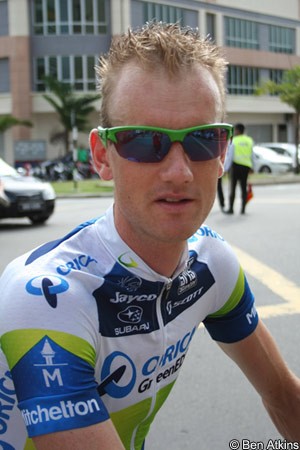Climber had been accused by Michael Rasmussen, who claimed entire 2007 Rabobank Tour team doped
 After stating earlier this week that it would seek to determine the truth after Michael Rasmussen made claims that the Rabobank squad took banned substances for the 2007 Tour de France, the Orica GreenEdge team has said that it is standing behind its rider Pieter Weening.
After stating earlier this week that it would seek to determine the truth after Michael Rasmussen made claims that the Rabobank squad took banned substances for the 2007 Tour de France, the Orica GreenEdge team has said that it is standing behind its rider Pieter Weening.
Weening was part of the Rabobank lineup in that year’s Tour and was thus accused by Rasmussen in his blanket claim of substance use.
On Monday the Orica GreenEdge team said in a statement that it was aware of the allegations and said that it would investigate.
“We have asked Pieter to fully re-confirm his legally binding written statement to the team regarding his career and these issues before and after joining the team, specifically with regards to the current allegations,” it said then.
Commenting today, the Australian WorldTour team had said that it has moved to the point where it is expressing support for him.
“Orica-GreenEdge is aware that Pieter Weening has made himself fully available to the Dutch NADO [national anti-doping organisation – ed.] for their ongoing, comprehensive investigations into doping of Dutch cyclists.
“The team has received documentation that based on information the Dutch NADO have – including in relation to Michael Rasmussen’s allegations of 2007- they have not opened any doping inquiry against Pieter Weening and do not posses any sort of evidence or testimony to do so. Pieter Weening has been fully collaborative in relation to this and ORICA-GreenEDGE would like to express its full support in him going onwards.”
Orica GreenEdge had previously required all its riders to sign a declaration that they had not doped in the past. Stuart O’Grady was one of those who signed that, but then was forced to admit doping in 1998 after his name came up this year in relation to retests.
Weening inked a new contract this year and is set to remain part of the team until the end of 2015. He is a past stage winner in both the Tour and the Giro d’Italia.
He won the Tour of Poland this season and was runner-up in the Tour de Langkawi plus the GP Impanis-Van Petegem.
Rasmussen’s claims had also implicated two other riders on the 2007 Tour squad, Oscar Freire and Juan Antonio Flecha. He was threatened with possible legal action by Freire, and quickly backtracked, saying that he didn’t see either take banned substances.
Ramussen has accused a number of riders of doping in his new book Yellow Fever. Amongst those he implicated was the Canadian Ryder Hesjedal, who then issued a statement admitting to using performance enhancers.
He indicated that it happened over a decade ago. “Even though those mistakes happened more than ten years ago, and they were short-lived, it does not change the fact that I made them and I have lived with that and been sorry for it ever since,” he wrote.
The following day, his Garmin-Sharp team manager Jonathan Vaughters said that the substances were used in 2003 and 2004, slightly contradicting the timeline suggested by Hesjedal’s statement.
Vaughters said that Hesjedal told him he didn’t use anything after 2004, and stated that he believes him. He said that the Canadian would face a lifetime ban if it is shown that he was not truthful to the anti-doping authorities about when he stopped.